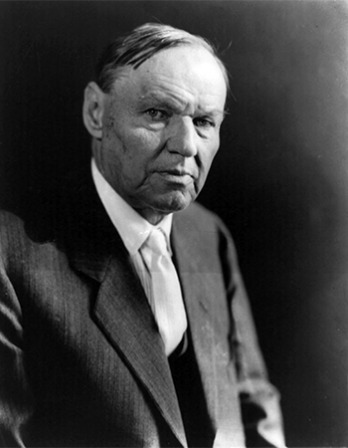Tiresias: I say you are the murderer of the king whose murderer you seek.
Oedipus: Not twice you shall say calumnies like this and stay unpunished.
Tiresias: It is not fate that I should be your ruin,
Apollo is enough; it is his care
to work this out.
Oedipus: Was this your own design or Creon’s?
Tiresias: Creon is no hurt to you, but you are to yourself.
Oedipus: Wealth, sovereignty, and skill outmatching skill
for the contrivance of an envied life!
Great store of jealousy fill your treasury chests,
if my friend Creon, friend from the first and loyal,
thus secretly attacks me, secretly
desires to drive me out and secretly
suborns this juggling, trick-devising quack,
this wily beggar who has only eyes
for his own gains, but blindness in his skill.
For, tell me, where have you seen clear, Tiresias,
with your prophetic eyes? When the dark singer,
the sphinx, was in your country, did you speak
word of deliverance to its citizens?
And yet the riddle’s answer was not the province
of a chance comer. It was a prophet’s task
and plainly you had no such gift of prophecy
from birds nor otherwise from any god
to glean a word of knowledge. But I came,
Oedipus, who knew nothing, and I stopped her.
I solved the riddle by my wit alone.
Mine was no knowledge got from birds. And now
you would expel me,
because you think that you will find a place
by Creon’s throne. I think you will be sorry,
both you and your accomplice, for your plot
to drive me out. And did I not regard you
as an old man, some suffering would have taught you
that what was in your heart was treason.
Chorus: We look at this man’s words and yours, my king,
and we find both have spoken them in anger.
We need no angry words but only thought
how we may best hit the god’s meaning for us.
Tiresias: If you are king, at least I have the right
no less to speak in my defense against you.
Of that much I am master. I am no slave
of yours, but Loxias’, and so I shall not
enroll myself with Creon for my patron.
Since you have taunted me with being blind,
here is my word for you.
You have your eyes but see not where you are
in sin, nor where you live, nor whom you live with.
Do you know who your parents are? Unknowing
you are an enemy to kith and kin
in death, beneath the earth, and in this life.
A deadly footed, double-striking curse,
from father and mother both, shall drive you forth
out of this land, with darkness on your eyes,
that now have such straight vision. Shall there be
a place will not be harbor to your cries,
a corner of Cithaeron will not ring
in echo to your cries, soon, soon—
when you shall learn the secret of your marriage,
which steered you to a haven in this house—
haven no haven, after lucky voyage?
And of the multitude of other evils
establishing a grim equality
between you and your children, you know nothing.
So, muddy with contempt my words and Creon’s!
Misery shall grind no man as it will you.
Oedipus: Is it endurable that I should hear
such words from him? Go and a curse go with you!
Quick, home with you! Out of my house at once!
Tiresias: I would not have come either had you not called me.
Oedipus: I did not know then you would talk like a fool—
or it would have been long before I called you.
Tiresias: I am a fool then, as it seems to you—
but to the parents who have bred you, wise.
Oedipus: What parents? Stop! Who are they of all the world?
Tiresias: This day will show your birth and will destroy you.
Oedipus: How needlessly your riddles darken everything.
Tiresias: But it’s in riddle-answering you are strongest.
Oedipus: Yes. Taunt me where you will find me great.
Tiresias: It is this very luck that has destroyed you.
Oedipus: I do not care, if it has saved this city.
Tiresias: Well, I will go. Come, boy, lead me away.
Oedipus: Yes, lead him off. So long as you are here,
you’ll be a stumbling block and a vexation;
once gone, you will not trouble me again.
Tiresias: I have said
what I came here to say not fearing your
countenance: there is no way you can hurt me.
I tell you, king, this man, this murderer
(whom you have long declared you are in search of,
indicting him in threatening proclamation
as murderer of Laius )—he is here.
In name he is a stranger among citizens
but soon he will be shown to be a citizen
true native Theban, and he’ll have no joy
of the discovery: blindness for sight
and beggary for riches his exchange,
he shall go journeying to a foreign country
tapping his way before him with a stick.
He shall be proved father and brother both
to his own children in his house; to her
that gave him birth, a son and husband both;
a fellow sower in his father’s bed
with that same father that he murdered.
Go within, reckon that out, and if you find me
mistaken, say I have no skill in prophecy.
© 1942 by the University of Chicago. Used with permission of the University of Chicago Press.
From Oedipus the King. Known for his good looks, grace, and musical skill, Sophocles as a teenager led the choral chant to celebrate the Greek victory against the Persians at the Battle of Salamis in 480 bc. Over the course of his career as a playwright, he received at least eighteen first prizes at the dramatic festivals, beginning in 468 BC with his debut play, Triptolemus. His tragedies include Oedipus at Colonus, Antigone, and Electra.
Back to Issue





